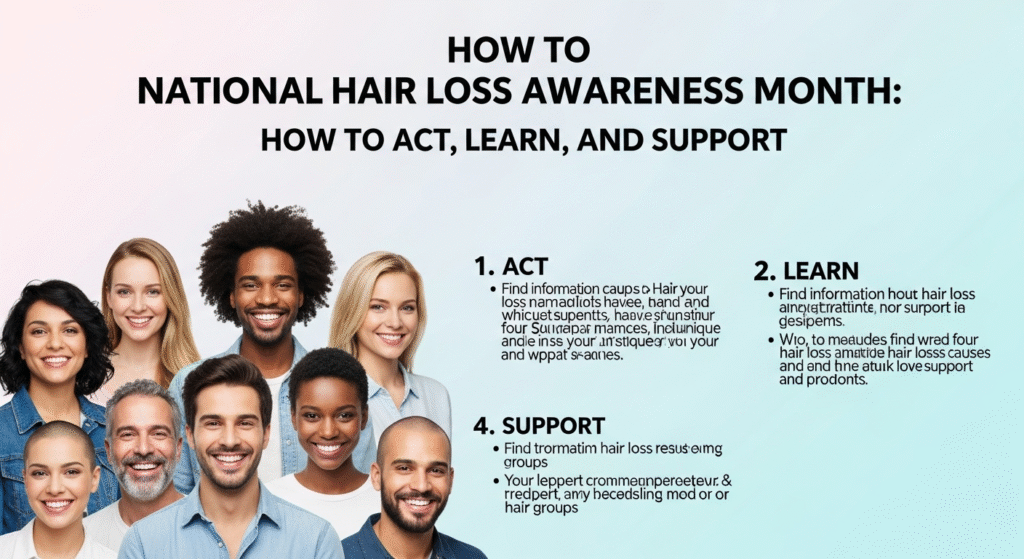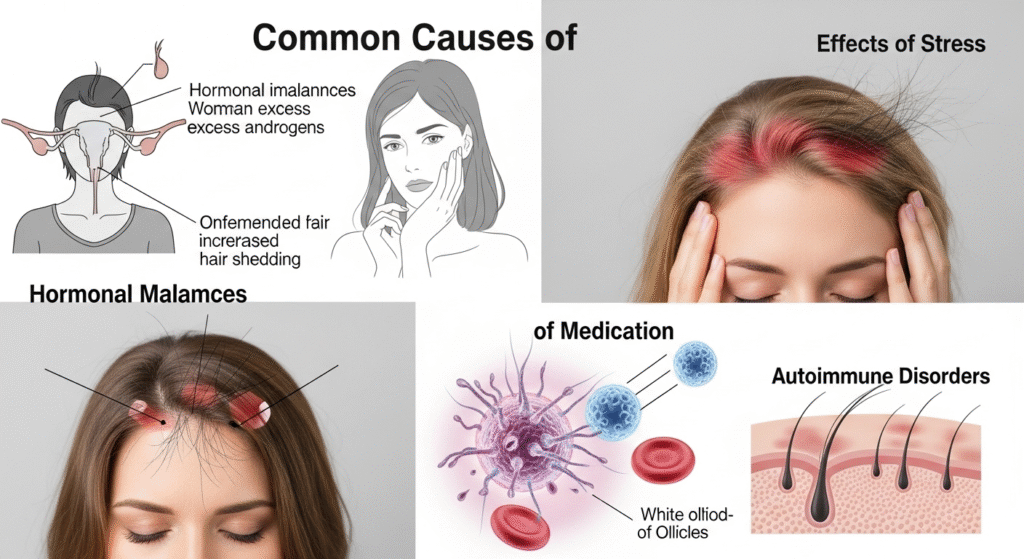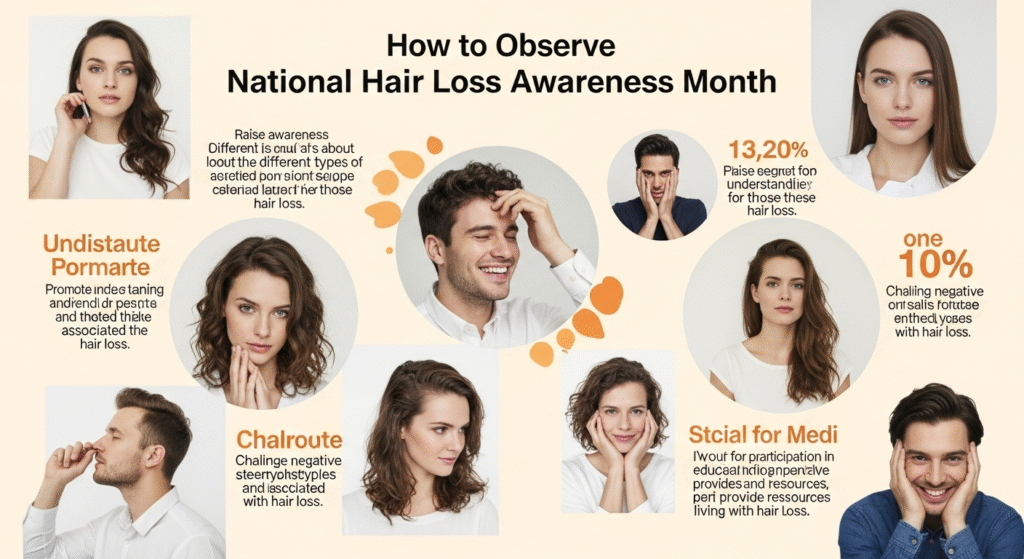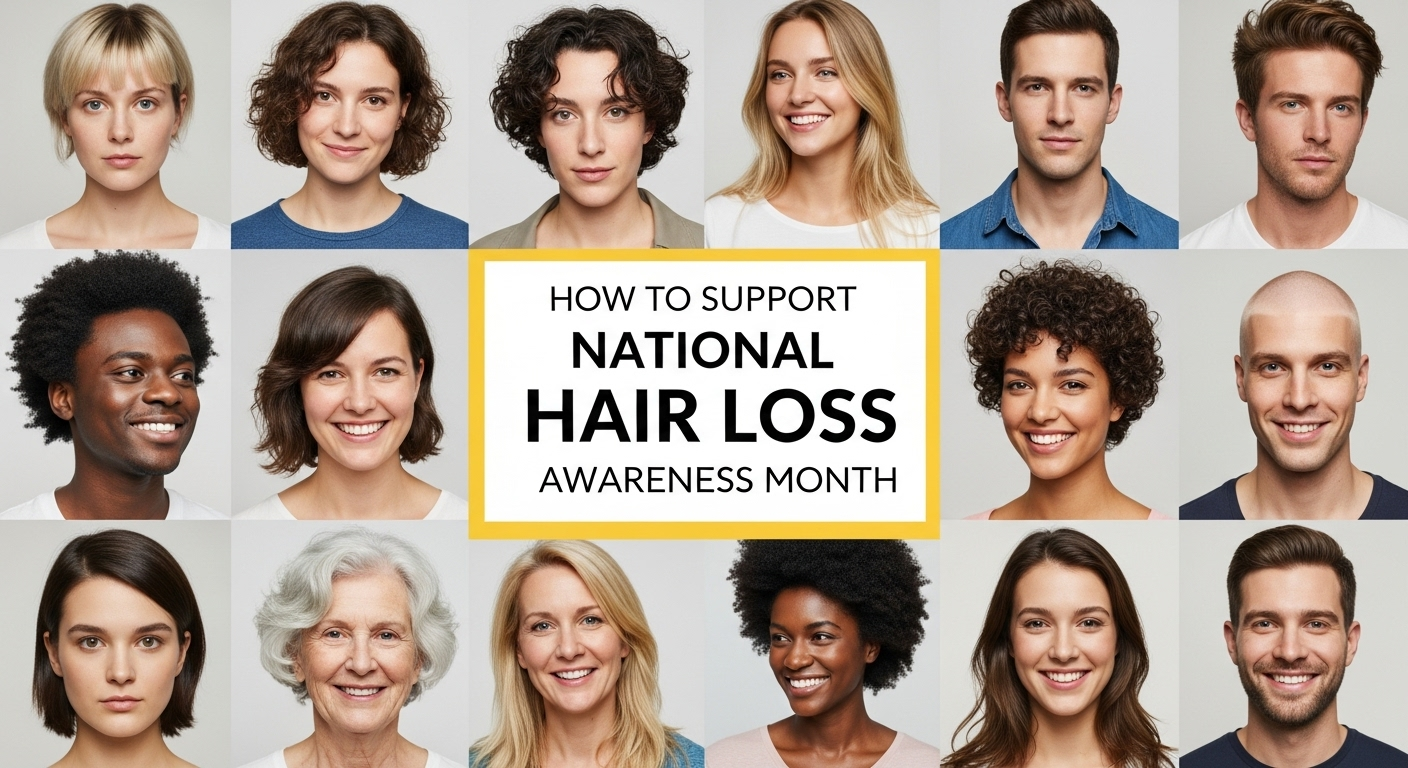Are you or someone you love facing the challenges of thinning hair or sudden hair loss? National Hair Loss Awareness Month is a powerful reminder that hair loss is a common and treatable condition affecting millions worldwide. This informative article will help you understand the causes, available treatments, and meaningful ways to take part in …
Are you or someone you love facing the challenges of thinning hair or sudden hair loss? National Hair Loss Awareness Month is a powerful reminder that hair loss is a common and treatable condition affecting millions worldwide.
This informative article will help you understand the causes, available treatments, and meaningful ways to take part in this important awareness campaign. Backed by expert insights and real recovery stories, we’ll walk you through everything you need to know to reclaim confidence, take action, and support others during this month and beyond.

What Is National Hair Loss Awareness Month?
National Hair Loss Awareness Month is observed every August and was initiated to bring visibility to the millions of people affected by various forms of hair loss. The American Academy of Dermatology (AAD) and other organizations use this month to educate the public, encourage early intervention, and reduce the stigma surrounding hair thinning and baldness.
Whether you’re battling hereditary hair loss, stress-induced shedding, or medical conditions like alopecia areata, this month is about empowerment—helping individuals find solutions and feel supported.
Why National Hair Loss Awareness Month Matters
Hair loss is more than a cosmetic issue—it deeply impacts mental well-being, self-esteem, and quality of life. In the U.S. alone, more than 60 million men and 40 million women are affected by some form of hair loss. Despite how common it is, many still suffer in silence due to embarrassment, misinformation, or fear of judgment.
National Hair Loss Awareness Month helps shift that narrative by encouraging open dialogue, providing credible information, and connecting people with specialists and resources. The campaign also promotes research and advocacy to improve hair loss treatments and access to care.
Common Causes of Hair Loss

Hair loss can happen for a variety of reasons. Understanding the cause is the first step toward effective treatment. Here are the most common triggers:
Genetic Hair Loss (Androgenetic Alopecia)
This hereditary condition, also known as male- or female-pattern baldness, is the most prevalent form of hair loss. It typically presents as a receding hairline, thinning at the crown, or diffuse thinning across the scalp.
Medical and Hormonal Conditions
- Alopecia Areata: An autoimmune disorder that causes patchy hair loss.
- Thyroid Disorders: Hypothyroidism or hyperthyroidism can interrupt hair growth cycles.
- Polycystic Ovary Syndrome (PCOS): Causes hormonal imbalance leading to hair thinning in women.
- Telogen Effluvium: Temporary shedding triggered by stress, surgery, or illness (e.g., COVID-19).
Lifestyle-Related Factors
- Stress and anxiety disrupt hormone levels and shorten hair growth phases.
- Poor nutrition, especially low iron, protein, or vitamin D, weakens hair follicles.
- Overstyling or harsh chemical treatments can damage hair and scalp health.
How to Observe National Hair Loss Awareness Month

Educate Yourself and Others
Use this month to learn about different types of hair loss and the available treatment options. Follow educational webinars hosted by dermatologists and trichologists or read reputable medical content from associations like the AAD.
Share Stories and Advocate
Join the conversation on social media using awareness hashtags, share your journey, or support a friend going through it. Even simple acts like reposting informative content can help normalize discussions around hair loss.
Evidence-Based Treatments and Prevention Tips
If you’re wondering whether hair loss can be reversed—the good news is, often it can be, especially if caught early.
FDA-Approved Treatments
- Minoxidil (Rogaine): A topical treatment that stimulates hair regrowth by prolonging the anagen (growth) phase.
- Finasteride (Propecia): A prescription pill that reduces DHT, the hormone responsible for shrinking hair follicles in men.
- Low-Level Laser Therapy (LLLT): Enhances blood circulation to the scalp and energizes follicles.
Lifestyle Modifications
- Eat a balanced, nutrient-rich diet with plenty of protein, iron, zinc, and vitamin D.
- Minimize stress through yoga, exercise, and mindfulness practices.
- Use gentle shampoos and avoid heat styling or tight hairstyles that strain the roots.
Surgical Interventions
- Follicular Unit Extraction (FUE) and FUT transplants are effective for long-term restoration, especially in advanced genetic hair loss cases.
- Scalp Micropigmentation can offer a non-surgical aesthetic option to mask thinning areas.
Emerging Therapies
Research into stem cell therapy, exosome treatment, and platelet-rich plasma (PRP) shows promising results for regenerating dormant follicles. These options may soon become more widely available as clinical studies expand.
FAQs
When is National Hair Loss Awareness Month observed?
It’s observed every August to raise awareness about all types of hair loss and encourage open conversations, screenings, and treatment.
Can women and children participate?
Absolutely. Hair loss affects both men and women of all ages. Education and early diagnosis benefit everyone.
Is hair loss always permanent?
No. Many types of hair loss—especially those caused by stress, illness, or poor diet—can be reversed with proper care and treatment.
What is the difference between minoxidil and finasteride?
Minoxidil is a topical over-the-counter solution suitable for both men and women. Finasteride is a prescription-only oral medication for men that reduces hormone-related hair loss.
Is a hair transplant permanent?
Yes, transplanted hair is typically permanent. However, ongoing care may still be necessary to preserve surrounding natural hair.
Conclusion
This National Hair Loss Awareness Month, take control of your hair health. Whether you’re experiencing hair thinning or supporting someone who is, education and early action make all the difference. Book a consultation with Dr. Uzma Irfan an ISHRS Certified Doctor in Islamabad today for a personalized scalp analysis and expert care plan.






